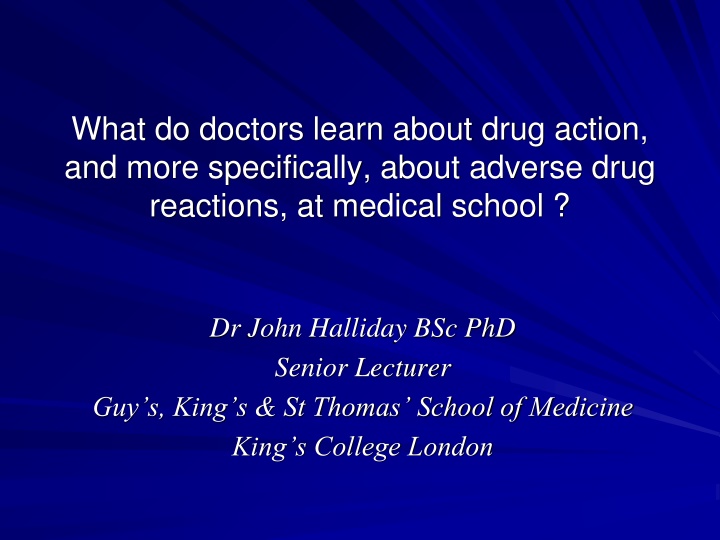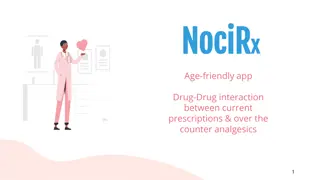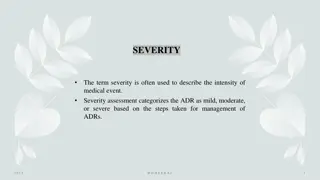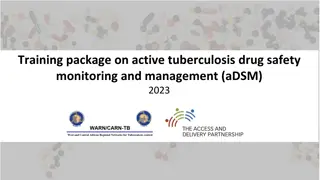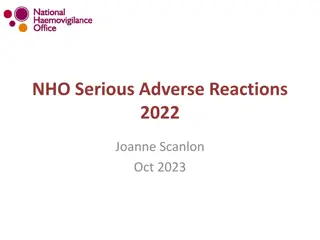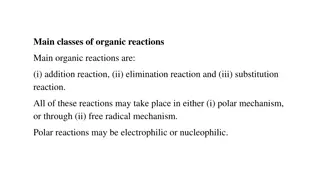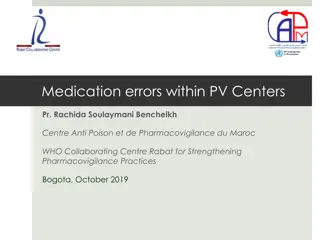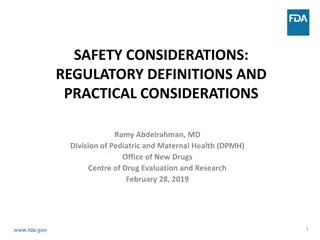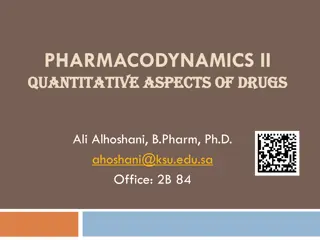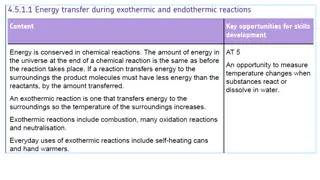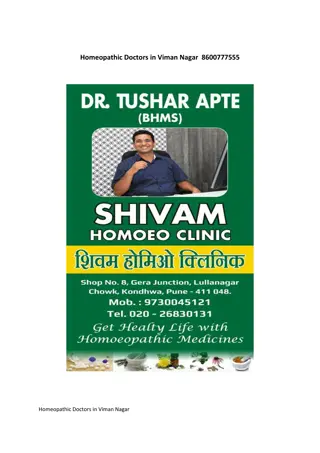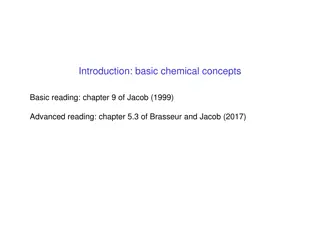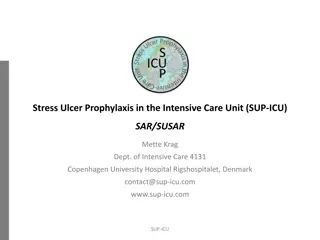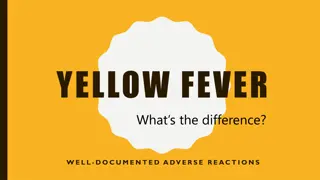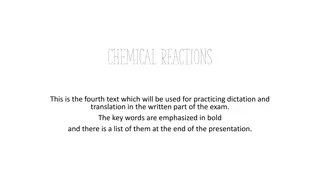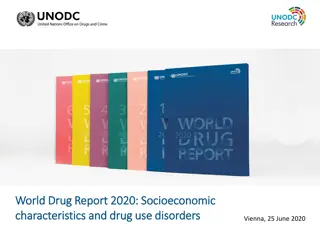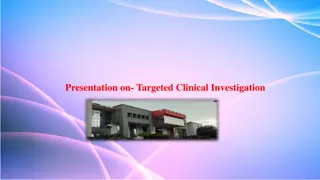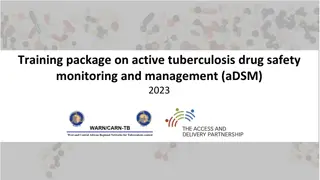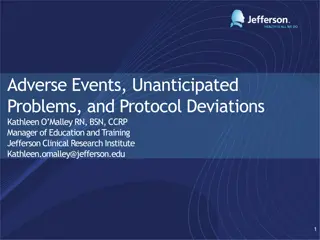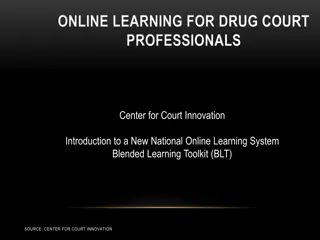Doctors' Learning on Drug Action & Adverse Reactions
Medical schools teach doctors about drug action, including adverse reactions, to ensure safe prescribing practices. Dr. John Halliday explains the importance of understanding treatment principles, patient views, medication safety, and adverse drug reactions in medical education. Recent studies in the US and UK highlight varying levels of ADR training during medical school.
Download Presentation

Please find below an Image/Link to download the presentation.
The content on the website is provided AS IS for your information and personal use only. It may not be sold, licensed, or shared on other websites without obtaining consent from the author.If you encounter any issues during the download, it is possible that the publisher has removed the file from their server.
You are allowed to download the files provided on this website for personal or commercial use, subject to the condition that they are used lawfully. All files are the property of their respective owners.
The content on the website is provided AS IS for your information and personal use only. It may not be sold, licensed, or shared on other websites without obtaining consent from the author.
E N D
Presentation Transcript
What do doctors learn about drug action, and more specifically, about adverse drug reactions, at medical school ? Dr John Halliday BSc PhD Senior Lecturer Guy s, King s & St Thomas School of Medicine King s College London
General Medical Council - Guidelines on Medical Education - Tomorrows Doctors (2003) Point 16. - Graduates must know about and understand the principles of treatment including the following. How to take account of patients' own views and beliefs when suggesting treatment options. The effective and safe use of medicines as a basis for prescribing, including side effects, harmful interactions, antibiotic resistance and genetic indicators of the appropriateness of drugs.
General Medical Council - Guidelines on Medical Education - Tomorrows Doctors (2003) Point 19. Graduates must be able to do the following safely and effectively. Perform a full physical examination, and a mental-state examination. Interpret the findings from the history, the physical examination, and the mental-state examination. Make clinical decisions based on the evidence they have gathered. Assess a patient's problems and form plans to investigate and manage these, involving patients in the planning process.
The New Doctor: Recommendations on General Clinical Training (GMC) April 1997 Post-registration House Officer Training No mention of side-effects or adverse reactions in this 35 page document
Have there been any recent studies on the teaching of ADRs in medical schools in the United States ? Centers for education and research on therapeutics report: survey of medication errors education during undergraduate and graduate medical education in the United States - Rosebraugh et al (2002) Clin Pharmac Ther, 71, 4-10 Q Is there a mandatory course on pharmacology or clinical pharmacology in 3rd or 4th year at your medical school ? A only 8% answered YES Only 53% reported that adverse drug reaction training was specifically covered in their 3rd or 4th year.
What about recent studies in the UK ? Adverse drug reaction teaching in UK undergraduate medical and pharmacy programmes. Cox et al (2004) J of Clinical Pharmacy & Therapeutics, 29,31- 35 All responding medical schools taught undergraduate medical students about ADRs and the Yellow Card Scheme However, only 43% of the responding medical schools provided students with a guide to reporting ADRs and only 57% of responding medical schools included questions on the Yellow Card Scheme in their assessments
What is the situation in my own medical school and selected others here in the UK ? The core teaching on adverse reactions takes place in clinical pharmacology where the real enthusiasts in teaching the topic are to be found. King s College London has this year re-introduced an extensive set of tutorials on clinical pharmacology (including adverse reactions) in Year 3, but there is no longer a separate examination in clinical pharmacology. Cambridge retains a formal course and examination in clinical pharmacology (including adverse drug reactions) University College London retains a substantial formal course in clinical pharmacology (including adverse drug reactions) and the subject constitutes a third of two of the major examinations St George s Hospital Medical School has no separate examination in clinical pharmacology but does give clinical pharmacology teaching a significant profile in examinations [Prof Joe Collier is the UK s only Professor of Medicines Policy]
How difficult is it to teach about ADRs ? As a generic issue it is not too difficult However, to teach about specific ADRs takes time and doctors have to be skilled in the clinical arts to be able to detect and treat low frequency ADRs which may not have been reported previously Lack of knowledge about the mechanism involved in an ADR means that such ADRs may have to be individually remembered rather than being understood The emphasis in undergraduate training has to be on how the important classes of drugs work, how they should be prescribed, and what the common and significant ADRs are likely to be even that is difficult to achieve in a crowded medical curriculum To be able to teach the student about all the individual low frequency side-effects reported in the BNF, for all the individual drugs in a class, is not possible
How rapidly do textbooks of clinical pharmacology [& indeed the BNF] respond to concerns ? Text-books tend to be conservative and include only information that has been unequivocally established Thus, for example, some of the current editions of standard clinical pharmacology text-books do not mention the problem of depressive or psychotic episodes with orally administered isotretinoin (e.g Roaccutane) used in the treatment of acne But then the BNF does not include the possibility of acute depression in its general introduction to Oral retinoid for acne . A history of depression appears half-way down the list of Cautions and reported mood changes two thirds the way down the Side-effects listing. Surely this would be a case for bringing the possibility of acute depressive episodes to the front of the list ?
How can the situation be improved ? (I) encourage the teaching of clinical pharmacology in medical schools Enable resources for the appointment of more clinical pharmacologists and specialist consultants who take an active interest in the problem of ADRs Devote adequate curriculum time to teaching about drugs and their effective and safe use Devote adequate time to generic issues about ADRs, the use of the appropriate reporting schemes [e.g. the Yellow Card Scheme], and cover important examples of classic ADR situations Follow up these two requirements with appropriate assessment in these areas Encourage students to be sceptical about the benefits of new drugs until they are fully exposed and of proven benefit, and with no greater potential for harm than established drugs [NICE guidelines; black triangle drugs; etc]
How can the situation be improved ? (II) encourage a more integrated approach The more experienced and skilful a clinician, the better they should be at avoiding, recognising and treating ADRs continue learning opportunities for doctors in practice One of the problems is that ADRs are no respecters of medical specialties very complex ADRs [perhaps requiring specialist attention to recognise let alone treat] can arise as readily in primary care as in specialist units all prescribing doctors have to be aware and responsible If appropriate, educate/involve the patient and their carers in monitoring their response to the treatment after all it is the patient who is at risk and he/she should be an informed patient Have an online mechanism for patients to report suspicions of an ADR, and perhaps to obtain advice
General Medical Council - Guidelines on Medical Education - Tomorrows Doctors (2003) Point 16. Graduates must know about and understand the principles of treatment including the following. (c) The effective and safe use of medicines as a basis for prescribing, including side effects, harmful interactions, antibiotic resistance and genetic indicators of the appropriateness of drugs. Point 19. Graduates must be able to do the following safely and effectively. Interpret the findings from the history, the physical examination, and the mental-state examination. Make clinical decisions based on the evidence they have gathered. Assess a patient's problems and form plans to investigate and manage these, involving patients in the planning process.
